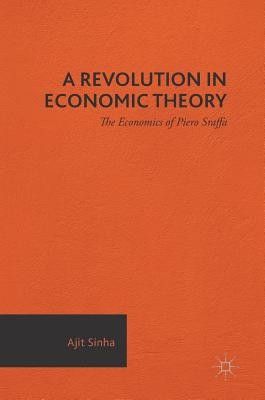
- We will send in 10–14 business days.
- Author: Ajit Sinha
- Publisher: Palgrave Macmillan
- Year: 2016
- Pages: 244
- ISBN-10: 3319306154
- ISBN-13: 9783319306155
- Format: 15.5 x 22 x 2 cm, hardcover
- Language: English
- SAVE -10% with code: EXTRA
Reviews
Description
This book draws on the work of one of the sharpest minds of the 20th century, Piero Sraffa. Ludwig Wittgenstein credited him for 'the most consequential ideas' of the Philosophical Investigations (1953) and put him high on his short list of geniuses. Sraffa's revolutionary contribution to economics was, however, lost to the world because economists did not pay attention to the philosophical underpinnings of his economics. Based on exhaustive archival research, Sinha presents an exciting new thesis that shows how Sraffa challenged the usual mode of theorizing in terms of essential and mechanical causation and, instead, argued for a descriptive or geometrical theory based on simultaneous relations. A consequence of this approach was a complete removal of 'agent's subjectivity' and 'marginal method' or counterfactual reasoning from economic analysis - the two fundamental pillars of orthodox economic theory.
EXTRA 10 % discount with code: EXTRA
The promotion ends in 17d.04:16:54
The discount code is valid when purchasing from 10 €. Discounts do not stack.
- Author: Ajit Sinha
- Publisher: Palgrave Macmillan
- Year: 2016
- Pages: 244
- ISBN-10: 3319306154
- ISBN-13: 9783319306155
- Format: 15.5 x 22 x 2 cm, hardcover
- Language: English English
This book draws on the work of one of the sharpest minds of the 20th century, Piero Sraffa. Ludwig Wittgenstein credited him for 'the most consequential ideas' of the Philosophical Investigations (1953) and put him high on his short list of geniuses. Sraffa's revolutionary contribution to economics was, however, lost to the world because economists did not pay attention to the philosophical underpinnings of his economics. Based on exhaustive archival research, Sinha presents an exciting new thesis that shows how Sraffa challenged the usual mode of theorizing in terms of essential and mechanical causation and, instead, argued for a descriptive or geometrical theory based on simultaneous relations. A consequence of this approach was a complete removal of 'agent's subjectivity' and 'marginal method' or counterfactual reasoning from economic analysis - the two fundamental pillars of orthodox economic theory.


Reviews